
Question Number 2393 by 123456 last updated on 19/Nov/15
![f:[0,1]→R x=a_0 ,a_1 a_2 a_3 ... f(x)=Σ_(i=0) ^(+∞) a_i is f(x) continuous in all x∈[0,1] f(0,9999...)=?? f(1)=1](Q2393.png)
$${f}:\left[\mathrm{0},\mathrm{1}\right]\rightarrow\mathbb{R} \\ $$$${x}={a}_{\mathrm{0}} ,{a}_{\mathrm{1}} {a}_{\mathrm{2}} {a}_{\mathrm{3}} ... \\ $$$${f}\left({x}\right)=\underset{{i}=\mathrm{0}} {\overset{+\infty} {\sum}}{a}_{{i}} \\ $$$$\mathrm{is}\:{f}\left({x}\right)\:\mathrm{continuous}\:\mathrm{in}\:\mathrm{all}\:{x}\in\left[\mathrm{0},\mathrm{1}\right] \\ $$$${f}\left(\mathrm{0},\mathrm{9999}...\right)=?? \\ $$$${f}\left(\mathrm{1}\right)=\mathrm{1} \\ $$
Commented by prakash jain last updated on 19/Nov/15

$${f}\left({x}\right)\:\mathrm{is}\:\mathrm{not}\:\mathrm{continous}\:\mathrm{is}\:\mathrm{limit}\:\mathrm{does}\:\mathrm{not} \\ $$$$\mathrm{exists}\:\mathrm{for}\:\mathrm{irrational}\:{x}\:\mathrm{and}\:\mathrm{also}\:\mathrm{for}\:\mathrm{rational} \\ $$$${x}=\:{p}/{q}\:\mathrm{where}\:{q}\neq\mathrm{2}^{{n}} \mathrm{5}^{{m}} \\ $$
Commented by prakash jain last updated on 19/Nov/15

$$\mathrm{I}\:\mathrm{don}'\mathrm{t}\:\mathrm{think}\:\mathrm{there}\:\mathrm{is}\:\mathrm{any}\:\mathrm{real}\:\mathrm{number}\:\mathrm{like} \\ $$$$\mathrm{0}.\mathrm{99999}....\:\left(\mathrm{infinite}\:\mathrm{times}\right).\:\mathrm{It}\:\mathrm{is}\:\:\mathrm{same}\:\mathrm{as}\:\mathrm{1}. \\ $$
Commented by prakash jain last updated on 19/Nov/15
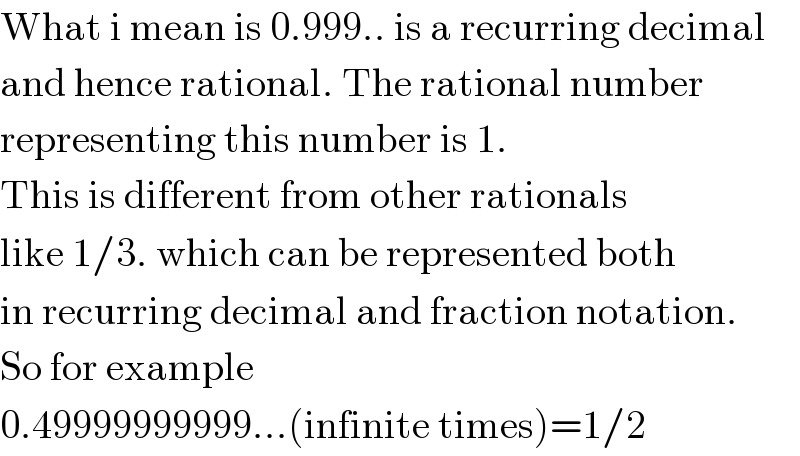
$$\mathrm{What}\:\mathrm{i}\:\mathrm{mean}\:\mathrm{is}\:\mathrm{0}.\mathrm{999}..\:\mathrm{is}\:\mathrm{a}\:\mathrm{recurring}\:\mathrm{decimal} \\ $$$$\mathrm{and}\:\mathrm{hence}\:\mathrm{rational}.\:\mathrm{The}\:\mathrm{rational}\:\mathrm{number} \\ $$$$\mathrm{representing}\:\mathrm{this}\:\mathrm{number}\:\mathrm{is}\:\mathrm{1}.\: \\ $$$$\mathrm{This}\:\mathrm{is}\:\mathrm{different}\:\mathrm{from}\:\mathrm{other}\:\mathrm{rationals} \\ $$$$\mathrm{like}\:\mathrm{1}/\mathrm{3}.\:\mathrm{which}\:\mathrm{can}\:\mathrm{be}\:\mathrm{represented}\:\mathrm{both} \\ $$$$\mathrm{in}\:\mathrm{recurring}\:\mathrm{decimal}\:\mathrm{and}\:\mathrm{fraction}\:\mathrm{notation}. \\ $$$$\mathrm{So}\:\mathrm{for}\:\mathrm{example} \\ $$$$\mathrm{0}.\mathrm{49999999999}...\left(\mathrm{infinite}\:\mathrm{times}\right)=\mathrm{1}/\mathrm{2} \\ $$
Answered by Filup last updated on 19/Nov/15
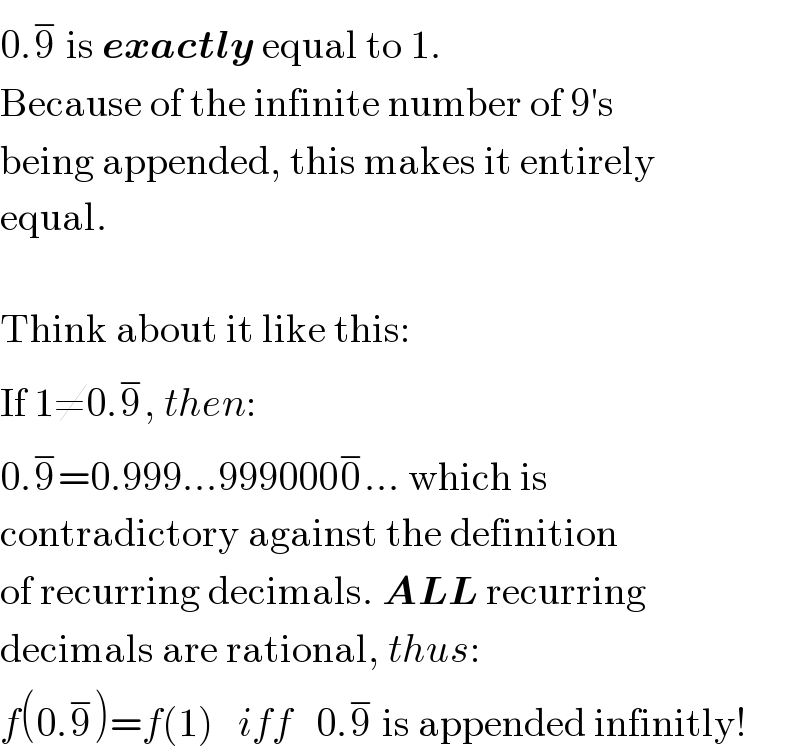
$$\mathrm{0}.\overset{−} {\mathrm{9}}\:\mathrm{is}\:\boldsymbol{{exactly}}\:\mathrm{equal}\:\mathrm{to}\:\mathrm{1}. \\ $$$$\mathrm{Because}\:\mathrm{of}\:\mathrm{the}\:\mathrm{infinite}\:\mathrm{number}\:\mathrm{of}\:\mathrm{9}'\mathrm{s} \\ $$$$\mathrm{being}\:\mathrm{appended},\:\mathrm{this}\:\mathrm{makes}\:\mathrm{it}\:\mathrm{entirely} \\ $$$$\mathrm{equal}. \\ $$$$ \\ $$$$\mathrm{Think}\:\mathrm{about}\:\mathrm{it}\:\mathrm{like}\:\mathrm{this}: \\ $$$$\mathrm{If}\:\mathrm{1}\neq\mathrm{0}.\overset{−} {\mathrm{9}},\:{then}: \\ $$$$\mathrm{0}.\overset{−} {\mathrm{9}}=\mathrm{0}.\mathrm{999}...\mathrm{999000}\overset{−} {\mathrm{0}}...\:\mathrm{which}\:\mathrm{is} \\ $$$$\mathrm{contradictory}\:\mathrm{against}\:\mathrm{the}\:\mathrm{definition} \\ $$$$\mathrm{of}\:\mathrm{recurring}\:\mathrm{decimals}.\:\boldsymbol{{ALL}}\:\mathrm{recurring} \\ $$$$\mathrm{decimals}\:\mathrm{are}\:\mathrm{rational},\:{thus}: \\ $$$${f}\left(\mathrm{0}.\overset{−} {\mathrm{9}}\right)={f}\left(\mathrm{1}\right)\:\:\:{iff}\:\:\:\mathrm{0}.\overset{−} {\mathrm{9}}\:\mathrm{is}\:\mathrm{appended}\:\mathrm{infinitly}! \\ $$
Commented by prakash jain last updated on 19/Nov/15

$$\mathrm{Correct}. \\ $$$$\mathrm{0}.\mathrm{4}\overset{−} {\mathrm{9}}=\mathrm{1}/\mathrm{2} \\ $$$$\mathrm{0}.\overset{−} {\mathrm{9}}=\mathrm{1}. \\ $$$$\mathrm{1}/\mathrm{2}\:\:=.\mathrm{5} \\ $$
Commented by 123456 last updated on 19/Nov/15
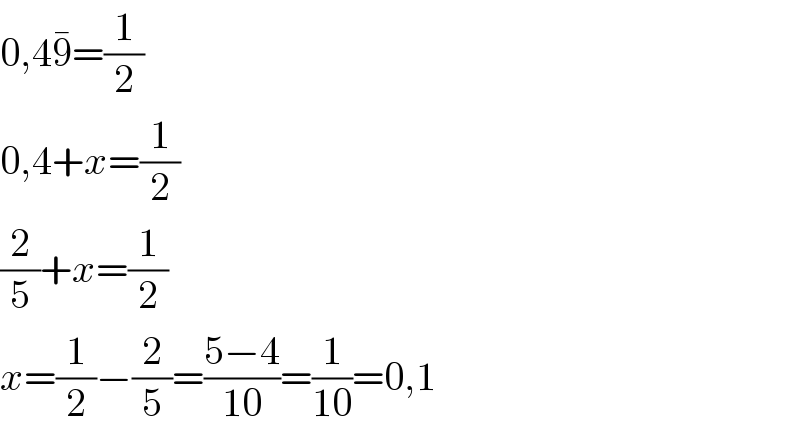
$$\mathrm{0},\mathrm{4}\bar {\mathrm{9}}=\frac{\mathrm{1}}{\mathrm{2}} \\ $$$$\mathrm{0},\mathrm{4}+{x}=\frac{\mathrm{1}}{\mathrm{2}} \\ $$$$\frac{\mathrm{2}}{\mathrm{5}}+{x}=\frac{\mathrm{1}}{\mathrm{2}} \\ $$$${x}=\frac{\mathrm{1}}{\mathrm{2}}−\frac{\mathrm{2}}{\mathrm{5}}=\frac{\mathrm{5}−\mathrm{4}}{\mathrm{10}}=\frac{\mathrm{1}}{\mathrm{10}}=\mathrm{0},\mathrm{1} \\ $$
Commented by prakash jain last updated on 20/Nov/15
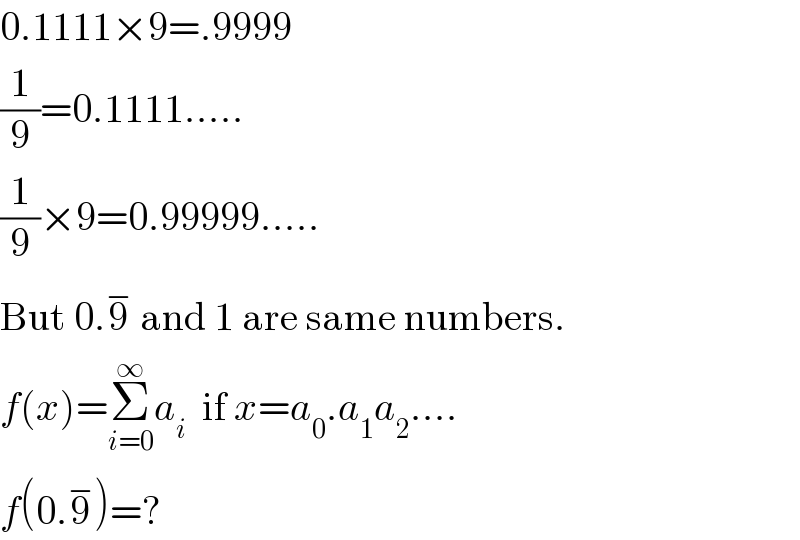
$$\mathrm{0}.\mathrm{1111}×\mathrm{9}=.\mathrm{9999} \\ $$$$\frac{\mathrm{1}}{\mathrm{9}}=\mathrm{0}.\mathrm{1111}..... \\ $$$$\frac{\mathrm{1}}{\mathrm{9}}×\mathrm{9}=\mathrm{0}.\mathrm{99999}..... \\ $$$$\mathrm{But}\:\mathrm{0}.\overset{−} {\mathrm{9}}\:\mathrm{and}\:\mathrm{1}\:\mathrm{are}\:\mathrm{same}\:\mathrm{numbers}. \\ $$$${f}\left({x}\right)=\underset{{i}=\mathrm{0}} {\overset{\infty} {\sum}}{a}_{{i}} \:\:\mathrm{if}\:{x}={a}_{\mathrm{0}} .{a}_{\mathrm{1}} {a}_{\mathrm{2}} .... \\ $$$${f}\left(\mathrm{0}.\overset{−} {\mathrm{9}}\right)=? \\ $$
Commented by RasheedAhmad last updated on 19/Nov/15
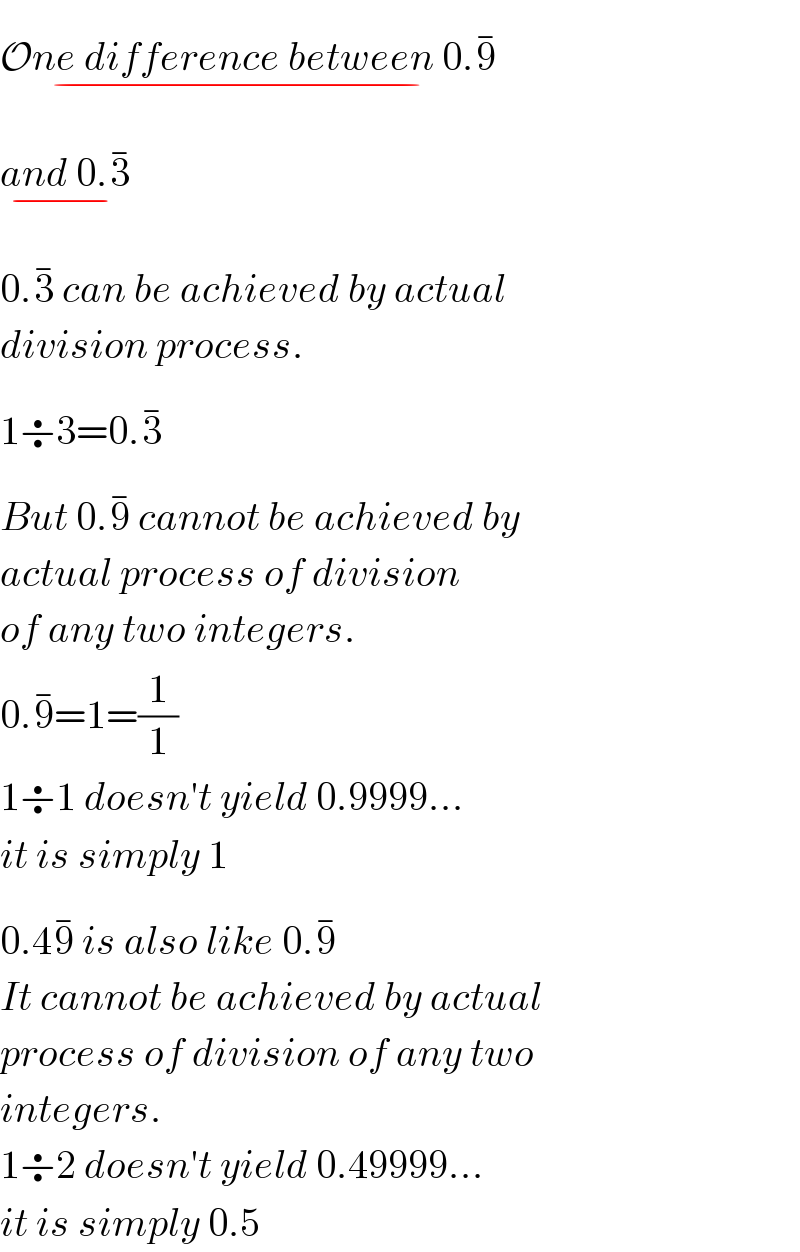
$$\underset{−} {\mathcal{O}{ne}\:{difference}\:{between}\:\mathrm{0}.\mathrm{9}} \\ $$$$\underset{−} {{and}\:\mathrm{0}.\mathrm{3}} \\ $$$$\mathrm{0}.\overline {\mathrm{3}}\:{can}\:{be}\:{achieved}\:{by}\:{actual} \\ $$$${division}\:{process}. \\ $$$$\mathrm{1}\boldsymbol{\div}\mathrm{3}=\mathrm{0}.\overline {\mathrm{3}} \\ $$$${But}\:\mathrm{0}.\overline {\mathrm{9}}\:{cannot}\:{be}\:{achieved}\:{by} \\ $$$${actual}\:{process}\:{of}\:{division} \\ $$$${of}\:{any}\:{two}\:{integers}. \\ $$$$\mathrm{0}.\overline {\mathrm{9}}=\mathrm{1}=\frac{\mathrm{1}}{\mathrm{1}} \\ $$$$\mathrm{1}\boldsymbol{\div}\mathrm{1}\:{doesn}'{t}\:{yield}\:\mathrm{0}.\mathrm{9999}... \\ $$$${it}\:{is}\:{simply}\:\mathrm{1} \\ $$$$\mathrm{0}.\mathrm{4}\overline {\mathrm{9}}\:{is}\:{also}\:{like}\:\mathrm{0}.\overline {\mathrm{9}} \\ $$$${It}\:{cannot}\:{be}\:{achieved}\:{by}\:{actual} \\ $$$${process}\:{of}\:{division}\:{of}\:{any}\:{two} \\ $$$${integers}. \\ $$$$\mathrm{1}\boldsymbol{\div}\mathrm{2}\:{doesn}'{t}\:{yield}\:\mathrm{0}.\mathrm{49999}... \\ $$$${it}\:{is}\:{simply}\:\mathrm{0}.\mathrm{5} \\ $$
Commented by 123456 last updated on 19/Nov/15

$$\frac{{a}}{\mathrm{9}}=\mathrm{0},\bar {{a}}\:\:\:{a}\in\left\{\mathrm{0},\mathrm{1},\mathrm{2},\mathrm{3},\mathrm{4},\mathrm{5},\mathrm{6},\mathrm{7},\mathrm{8},\mathrm{9}?\right\} \\ $$$$\frac{\mathrm{9}}{\mathrm{9}}=\mathrm{0},\mathrm{9999}... \\ $$$$\mathrm{9}\mid\mathrm{9} \\ $$$$\mathrm{0}\:\:\mathrm{1} \\ $$$$\mathrm{9}\mid\mathrm{9} \\ $$$$\mathrm{90}\lfloor\mathrm{0},\mathrm{99}... \\ $$$$\mathrm{81} \\ $$$$\:\:\mathrm{90} \\ $$$$\:\:\mathrm{81} \\ $$$$\:\:\:\:\vdots \\ $$$$\mathrm{4}\mid\mathrm{4} \\ $$$$\mathrm{40}\:\lfloor\mathrm{0},\mathrm{9}... \\ $$$$\mathrm{36} \\ $$$$\:\:\:\mathrm{40} \\ $$$$\:\:\:\:\vdots \\ $$
Commented by Rasheed Soomro last updated on 20/Nov/15
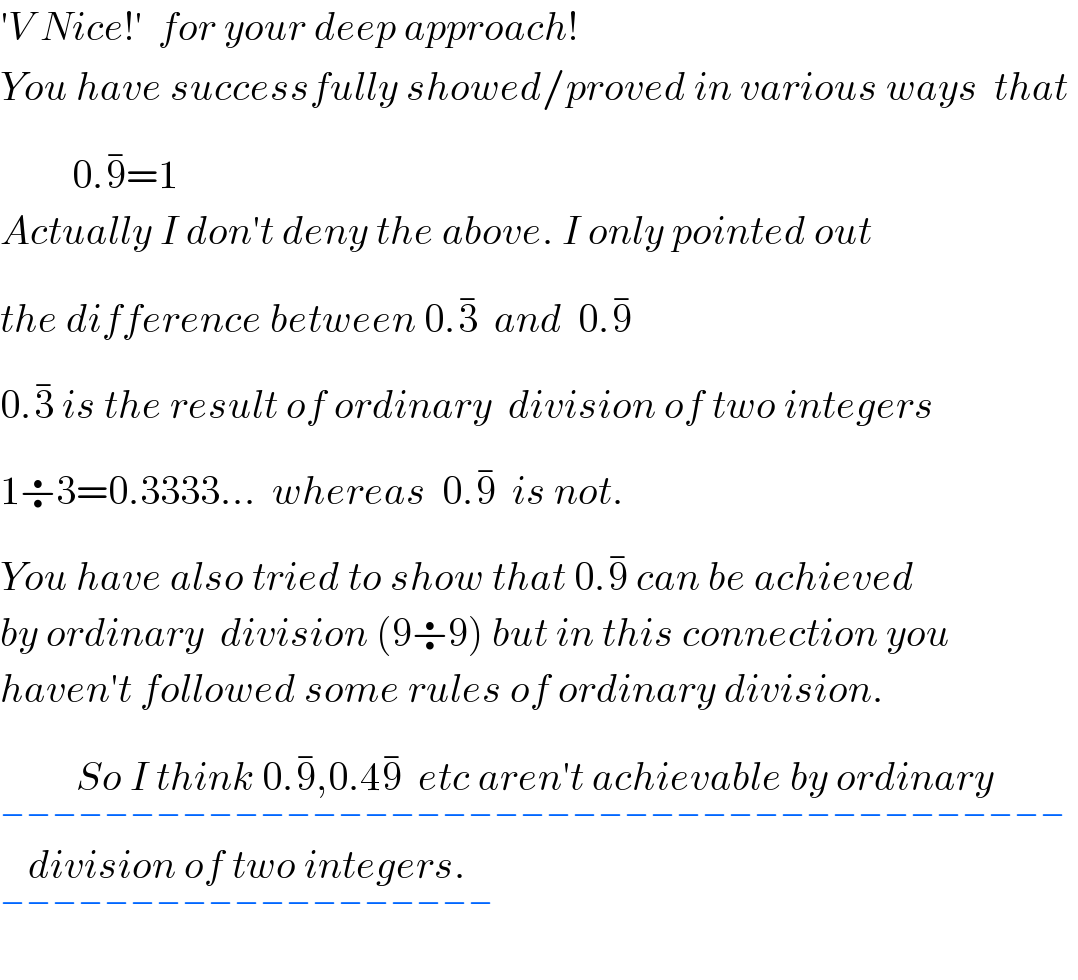
$$'{V}\:{Nice}!'\:\:{for}\:{your}\:{deep}\:{approach}! \\ $$$${You}\:{have}\:{successfully}\:{showed}/{proved}\:{in}\:{various}\:{ways}\:\:{that} \\ $$$$\:\:\:\:\:\:\:\:\:\mathrm{0}.\overline {\mathrm{9}}=\mathrm{1} \\ $$$${Actually}\:{I}\:{don}'{t}\:{deny}\:{the}\:{above}.\:{I}\:{only}\:{pointed}\:{out} \\ $$$${the}\:{difference}\:{between}\:\mathrm{0}.\overline {\mathrm{3}}\:\:{and}\:\:\mathrm{0}.\overline {\mathrm{9}} \\ $$$$\mathrm{0}.\overline {\mathrm{3}}\:{is}\:{the}\:{result}\:{of}\:{ordinary}\:\:{division}\:{of}\:{two}\:{integers} \\ $$$$\mathrm{1}\boldsymbol{\div}\mathrm{3}=\mathrm{0}.\mathrm{3333}...\:\:{whereas}\:\:\mathrm{0}.\overline {\mathrm{9}}\:\:{is}\:{not}. \\ $$$${You}\:{have}\:{also}\:{tried}\:{to}\:{show}\:{that}\:\mathrm{0}.\overline {\mathrm{9}}\:{can}\:{be}\:{achieved} \\ $$$${by}\:{ordinary}\:\:{division}\:\left(\mathrm{9}\boldsymbol{\div}\mathrm{9}\right)\:{but}\:{in}\:{this}\:{connection}\:{you} \\ $$$${haven}'{t}\:{followed}\:{some}\:{rules}\:{of}\:{ordinary}\:{division}. \\ $$$$\underset{−−−−−−−−−−−−−−−−−−−−−−−−−−−−−−−−−−−−−−−−−} {{So}\:{I}\:{think}\:\mathrm{0}.\mathrm{9},\mathrm{0}.\mathrm{49}\:\:{etc}\:{aren}'{t}\:{achievable}\:{by}\:{ordinary}} \\ $$$$\underset{−−−−−−−−−−−−−−−−−−−} {{division}\:{of}\:{two}\:{integers}.} \\ $$$$ \\ $$
Commented by 123456 last updated on 19/Nov/15

$$\mathrm{0},\mathrm{9999}... \\ $$$$=\mathrm{9}/\mathrm{10}+\mathrm{9}/\mathrm{10}^{\mathrm{2}} +... \\ $$$$=\frac{\mathrm{9}/\mathrm{10}}{\mathrm{1}−\mathrm{1}/\mathrm{10}}=\frac{\mathrm{9}/\mathrm{10}}{\mathrm{9}/\mathrm{10}}=\mathrm{1}\:\left(\mathrm{infinite}\:\mathrm{pg}\right) \\ $$$$\mathrm{or} \\ $$$$\mathrm{s}=\mathrm{0},\mathrm{999}.... \\ $$$$\mathrm{10s}=\mathrm{9},\mathrm{999}.... \\ $$$$\mathrm{9s}=\mathrm{9} \\ $$$$\mathrm{s}=\mathrm{1} \\ $$$$\mathrm{ps}: \\ $$$$\mathrm{1}=\mathrm{0},\mathrm{11111111}...._{\mathrm{2}} \\ $$$$\mathrm{since} \\ $$$$\underset{{i}=\mathrm{1}} {\overset{+\infty} {\sum}}\frac{\mathrm{1}}{\mathrm{2}^{{i}} }=\frac{\mathrm{1}/\mathrm{2}}{\mathrm{1}−\mathrm{1}/\mathrm{2}}=\mathrm{1} \\ $$$$\mathrm{if}\:{f}\:\mathrm{doenst}\:\mathrm{is}\:\mathrm{continuous}\:\mathrm{them}\:\left(\mathrm{dont}\:\mathrm{sure}\right) \\ $$$$\underset{\mathrm{n}\rightarrow+\infty} {\mathrm{lim}}\:{f}\left({x}_{{n}} \right)\neq{f}\left(\underset{{n}\rightarrow+\infty} {\mathrm{lim}}\:{x}_{{n}} \right)\:\mathrm{in}\:\mathrm{general} \\ $$$$\mathrm{them}\:\mathrm{this}\:\mathrm{have}\:\mathrm{something}\:\mathrm{about} \\ $$$${f}\left(\mathrm{0},\mathrm{99}...\right)\:\mathrm{and}\:{f}\left(\mathrm{1}\right)\:{or} \\ $$$$\lfloor\mathrm{0},\mathrm{999}...\rfloor\:\mathrm{and}\:\lfloor\mathrm{1}\rfloor \\ $$$$\mathrm{or}\:\mathrm{i}\:\mathrm{think}\:\mathrm{it}\:\mathrm{have}\::\mathrm{v} \\ $$
Commented by Rasheed Soomro last updated on 20/Nov/15

$$\mathrm{0}.\overline {\mathrm{9}}=\mathrm{1}\Rightarrow{f}\left(\mathrm{0}.\overline {\mathrm{9}}\right)={f}\left(\mathrm{1}\right)=\mathrm{1} \\ $$$${On}\:{the}\:{other}\:{hand}\:{f}\left(\mathrm{0}.\overline {\mathrm{9}}\right)=\mathrm{9}.\infty=\infty \\ $$$${That}\:{means}\:{to}\:{avoid}\:{contadiction}\:{we}\:{should} \\ $$$${deny}\:{the}\:{separte}\:{existence}\:{of}\:\mathrm{0}.\overline {\mathrm{9}}\:{and}\:{think}\:'\:{it}\:{is} \\ $$$${nothing}\:{but}\:\mathrm{1}'\:? \\ $$$${Similarly}\:{f}\left(\mathrm{0}.\mathrm{4}\overline {\mathrm{9}}\right)={f}\left(\mathrm{0}.\mathrm{5}\right)=\mathrm{5}? \\ $$
Commented by 123456 last updated on 20/Nov/15

$$\mathrm{one}\:\mathrm{day}\:\mathrm{in}\:\mathrm{some}\:\mathrm{random}\:\mathrm{math}\:\mathrm{i}\:\mathrm{found} \\ $$$$\mathrm{about}\:\lfloor\mathrm{0},\mathrm{99}...\rfloor=\mathrm{0}\:\mathrm{and}\:\lfloor\mathrm{1}\rfloor=\mathrm{1}\:\mathrm{but}\:\mathrm{0},\mathrm{9}..=\mathrm{1} \\ $$$$\mathrm{the}\:\mathrm{answer}\:\mathrm{them}\:\mathrm{give}\:\mathrm{are}\:\mathrm{about}\:\mathrm{continuity} \\ $$$$\mathrm{of}\:\lfloor{x}\rfloor,\:\mathrm{i}\:\mathrm{will}\:\mathrm{search}\:\mathrm{the}\:\mathrm{thing}\:\mathrm{later}. \\ $$
Commented by Rasheed Soomro last updated on 21/Nov/15

$$\mathcal{I}\:'{ll}\:{wait}\:{for}\:{update}! \\ $$
